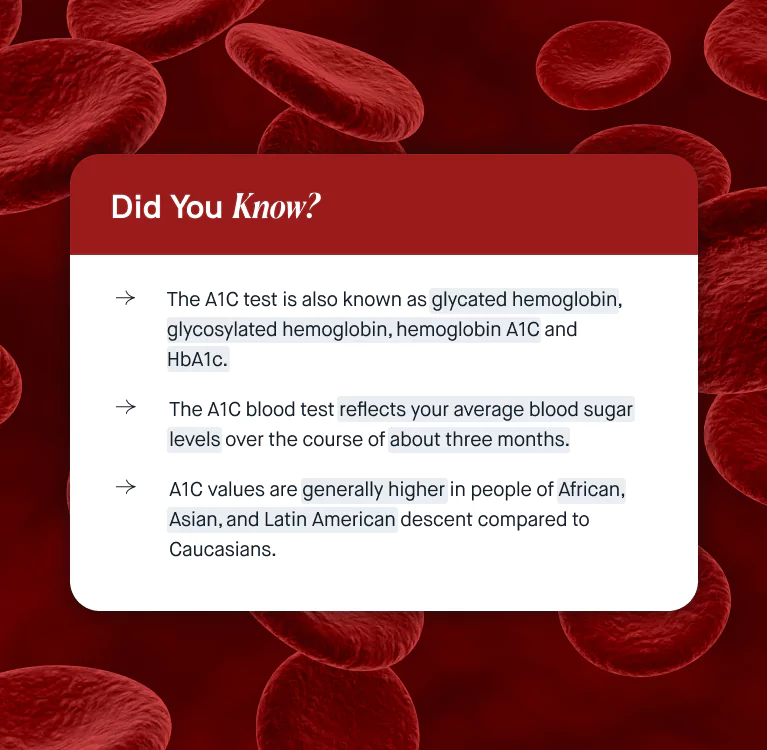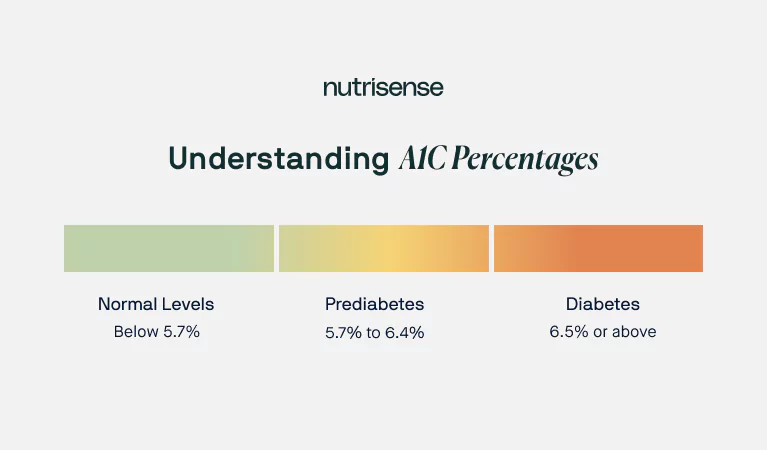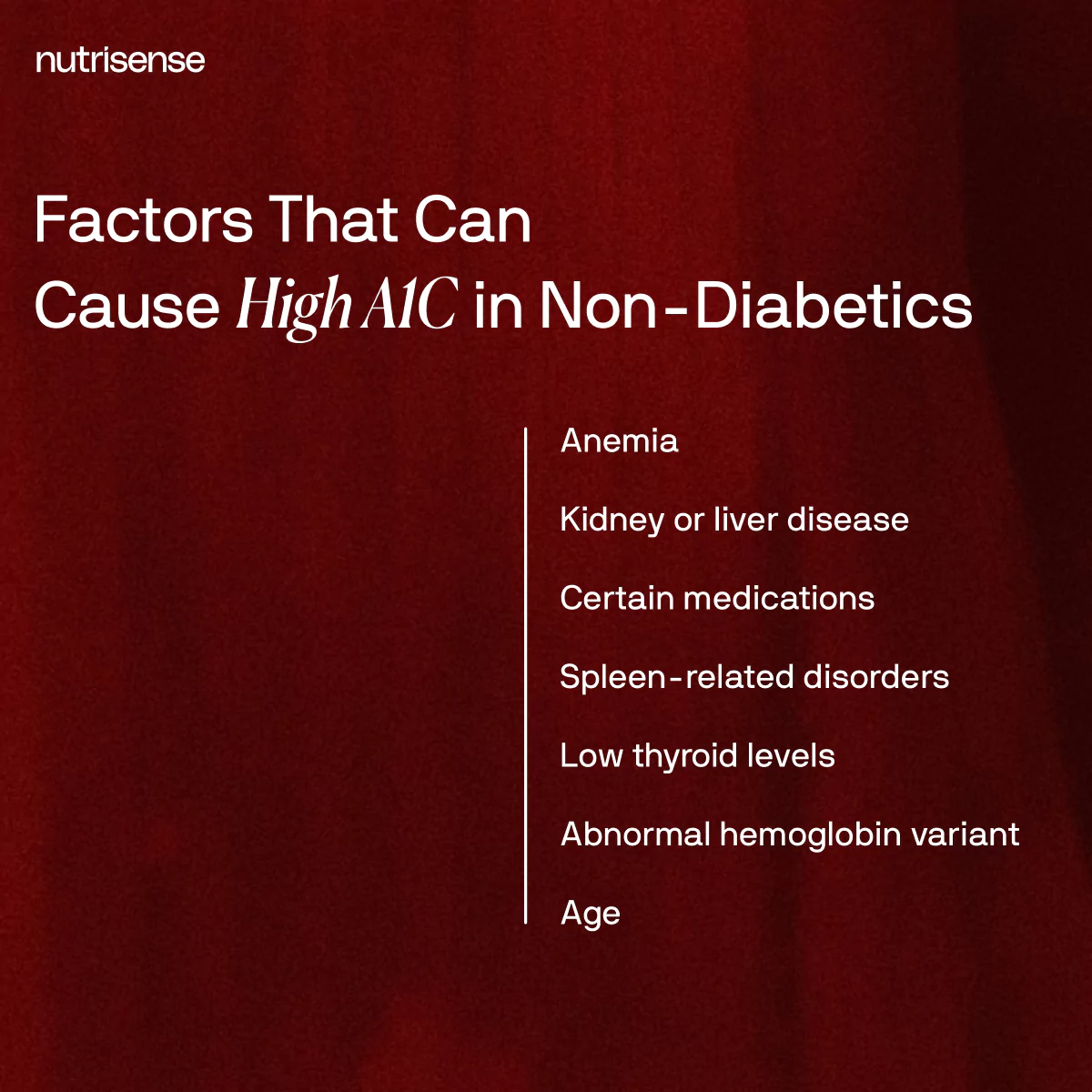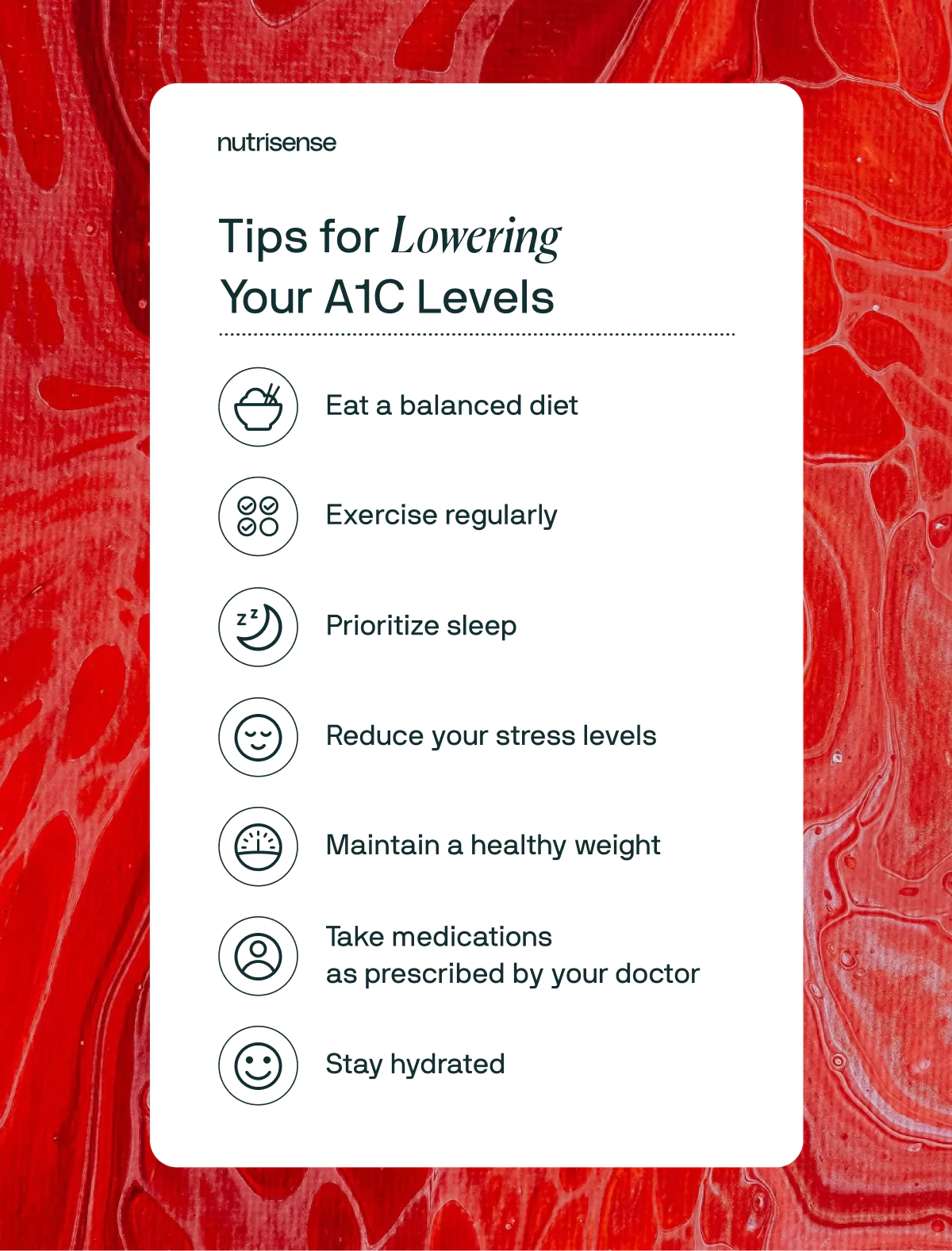High A1C Not Diabetic? 7 Surprising Causes & Normal Ranges

Key Takeaways
- What is A1C? HbA1C reflects your average blood glucose over the past 2–3 months.
- Normal vs. High: A level below 5.7% is considered normal. 5.7% to 6.4% indicates prediabetes risk.
- Non-Diabetic Causes: Factors like anemia, thyroid issues, and aging can falsely elevate A1C results.
- What is A1C? HbA1C reflects your average blood glucose over the past 2–3 months.
- Normal vs. High: A level below 5.7% is considered normal. 5.7% to 6.4% indicates prediabetes risk.
- Non-Diabetic Causes: Factors like anemia, thyroid issues, and aging can falsely elevate A1C results.
You’ve been doing your best—eating better, moving more—but your A1C is still high. It’s frustrating, confusing, and a little scary. You’re not alone!
HbA1C, or A1C (glycated hemoglobin), is a measurement used to reflect your average blood glucose over the past two to three months.
While the A1C test is often linked to diabetes screening (it’s a risk factor for diabetes mellitus), even non‑diabetic adults can see elevated A1C levels. In this article, you’ll learn more about what the A1C test measures, seven surprising causes of high A1C in people without diabetes—and exactly what to do next.
What Does The A1C Test Measure?

In a nutshell, A1C test measures glycated hemoglobin, which forms when glucose in your blood attaches to hemoglobin: the oxygen-rich protein found in red blood cells. Because red cells live about eight to 12 weeks, your A1C reflects the average blood sugar over the past two to three months.
We say hemoglobin is ‘oxygen-rich’ because it’s in charge of moving oxygen from your lungs to other tissues in the body.
Glucose attaches to the hemoglobin protein in the blood, and the amount of this glycated hemoglobin can be measured by a hemoglobin A1C test. This provides a good proxy of how much glucose on average was present in your bloodstream over a two to three-month period.
So what happens when A1C is too high? Persistently high A1C levels correlate with risks such as impaired fasting glucose, high blood pressure or hypertension, obesity, type 2 diabetes, and cardiovascular diseases.
However, remember: factors beyond your blood sugar or glucose level spikes—like certain health conditions—can also elevate your A1C.
What Are Normal A1C Levels?
You might be wondering what is considered a normal A1C range for non-diabetic adults and what's considered to be too high. According to the A1C ranges from the Centers for Disease Control and Prevention:

- A reading under 5.7 percent is considered to be a normal A1C level
- An A1C reading between 5.7 percent and 6.4 percent may indicate a risk of prediabetes
- A result of 6.5 percent or above may be a sign of diabetes
How High is Too High for A1C Levels?
A dangerous level (which means you should likely be thinking of ways to lower A1C levels) is generally accepted as nine percent or higher. This can significantly increase your diabetes risk, as well as risk of complications from the condition.
As you review your A1C levels with your doctor, it’s good to consider what other variables may be impacting these numbers. While a person’s sex has not been shown to affect A1C levels, there are many factors, such as age, that can influence your A1C levels and cause them to be elevated—and it’s more common than you think.
Did you know…? A study by the U.S. National Library of Medicine found that adults without a history of diabetes often have A1C levels at 6% or greater.
Can You Have Higher A1C Levels Without Diabetes?
The short answer is yes: it is possible to have high A1C levels without diabetes. Because the A1C test gauges the glucose attached to hemoglobin, any number of factors that influence hemoglobin can impact the results.
Iron deficiency anemia as well as B12 or folate-deficiency anemia, for example, may cause A1C to be falsely elevated. If you have high A1C, you’ll want to work closely with a healthcare professional who can help:
- Assess your overall health
- Check whether you are at a higher risk of false A1C elevations
and accordingly determine the underlying cause through additional tests and a comprehensive evaluation.
Find the right Nutrisense programto turn insight into progress.
You’ve seen how the A1C test works and what “normal A1C levels” look like. But even without diabetes, a range of factors, from nutrient deficiencies to chronic illness, can push your A1C upward.
7 Reasons Your A1C Is High Even Though You’re Not Diabetic

From supplements to vitamin deficiencies, many factors can cause a high A1C result even if you don’t have diabetes-risk related high blood sugar. Here are seven of the most common causes for high A1C levels among people who do not have diabetes. We’ve also added helpful tips from our glucose-certified registered dietitians, to help you see what to do:
1) You Have Anemia
What happens: As we mentioned, any interference with red blood cells or changes in hemoglobin can skew A1C results. Anemia, which is a condition usually caused by a lack of iron or deficiencies in vitamins B12 or folate, is a good example.
What the science says: According to one study, iron-deficient individuals without diabetes had higher A1C more frequently. When classified by gender, the study found that iron-deficient women in particular, were more likely to have an increased risk of this higher A1C reading.
Glucose-Certified Dietitian Tip
- Consult your healthcare provider and request labs for ferritin, serum iron, B12, and folate.
- Work 1:1 with a glucose expert to manage iron-deficiencies through diet or supplements.
- Monitor your glucose levels continually to see if you can spot any patterns in your intestinal glucose (that may be affecting your average blood glucose).
- Check your A1C levels again after two to three months to confirm normalization.
2) Aging Can Shift Your A1C, Even Without Diabetes
Early studies looking at the impact of age on A1C failed to demonstrate an association due to failures in methodology. However, newer studies like this one studying the effects of age on A1C have found a link between age and higher A1C in individuals with normal glucose and without diabetes.
Researchers believe that changes in the rate of glycation associated with aging may be responsible for this elevated A1C reading.
Glucose-Certified Dietitian Tip
- Remember, A1C may increase slightly with age, even if your glucose stays in the normal range for your age.
- If your A1C rises unexpectedly, use CGM, glucose biosensor or fingerstick data to cross-check average glucose.
- Talk to your provider about setting age-adjusted A1C targets, especially if you’re otherwise healthy.
3) Your Low Thyroid Levels Might Be Slowing Things Down
What happens: Thyroid hormones regulate your metabolic rate and the rate at which your body burns calories. The amount of thyroid hormones in the bloodstream can affect your A1C level.
What the science says: Hypothyroidism has been shown to cause elevated A1C levels, or give you false results—even when blood glucose levels are normal. This may be due to altered red blood cell turnover and metabolic changes that influence how long glucose stays attached to hemoglobin.
Glucose-Certified Dietitian Tip
- If you suspect thyroid dysfunction (or have other symptoms), ask for a full thyroid panel.
- Work with your healthcare provider to manage hypothyroidism and re-check your A1C levels after stabilization.
- If your thyroid is off, your A1C might be too. A registered dietitian can help you track what’s really going on—without the guesswork.
4) Your Genes Could Be Skewing Your A1C
What happens: Did you know there are multiple variants of hemoglobin? The most common type is hemoglobin A. It’s not common to know your type, but if you’re wondering what’s leading to elevated A1C levels, you may want to check yours with your doctor.
What the science says: Type HbAS, which is most commonly observed in people of African descent, is an inherited blood disorder that can lead to false A1C readings that may not accurately reflect your glycemic control.
Glucose-Certified Dietitian Tip
- To find out what types you have, you might talk to your doctor about considering a blood test called the hemoglobin electrophoresis test.
- Discuss A1C levels with your provider before making changes based on those results alone.
5) Some Medications Can Cause High A1C Levels
What happens: Several different medications may interfere with A1C test results. Some can even cause errors in readings or bring up inaccurate results. For example, some anti-retroviral drugs and even over-the-counter drugs like aspirin can cause your A1C levels to appear inflated or inaccurate.
What the science says: The types of medicines that can lead to false A1C levels include drugs that cause hemolysis (a rupture of red blood cells), such as dapsone. This study also found evidence that extremely high doses of antioxidants may also affect glycation.
Research suggests that chronic or overuse of certain medications is what may skew the results of an A1C test to be high. However, low doses of medications like aspirin have also been found to cause A1C levels to skew low and lead to low A1C levels.
Glucose-Certified Dietitian Tip
- Review your medications with a healthcare provider if your A1C doesn’t align with your average blood glucose.
- Ask whether an oral glucose tolerance test, or other lab marker will add any clarity.
- Track glucose with a CGM or glucose biosensor when you change any medication to see if patterns emerge over time.
- Always remember: it’s best to avoid self-adjusting medications. Work with your doctor to make informed changes
6) You Have Kidney Disease or Liver Disease

What happens: Those who suffer from kidney disease may find it more challenging to rely on the efficacy of A1C tests. Kidney disease can cause complications like anemia, malnutrition, and even kidney failure.
What the science says: These may affect the results of an A1C test. In the case of liver disease, the A1C test may also not be an accurate predictor of glycemic control due to anemia, which can affect your red blood cells.
Glucose-Certified Dietitian Tip
- If you have a kidney issue, it’s best to discuss it with a specialist! Your nephrologist or hepatologist can interpret A1C in context of your overall health.
7) You Have a Spleen Disorder

What happens: Spleen disorders, like sickle cell or asplenia, may also impact your levels during an A1C test. Some research has shown that A1C levels can appear elevated following a splenectomy, which is the surgical removal of the spleen.
What the science says: These disorders—called hemoglobinopathies—can alter hemoglobin and red blood cell turnover, impacting the accuracy of A1C tests. People with inherited hemoglobin variants may experience misleading, or falsely high A1C readings.
Glucose-Certified Dietitian Tip
- Ask your doctor about getting a hemoglobin variant screen if you have a history of sickle cell or spleen-related disorders.
- Consider using fructosamine testing (fructosamine is a glycated protein that can reflect your average blood glucose level) or use a tool like a CGM or glucose biosensor, for a more accurate reflection of glucose control.
- Discuss your condition with your provider before making any changes based on A1C levels alone.
How Can You Lower Your A1C?

As we’ve discussed, there are many reasons why your A1C may be elevated even when your glucose levels are still within a normal, healthy range. Luckily, there are many lifestyle changes that may help you lower your A1C levels over time, such as:
- Weight loss, or maintaining a healthy weight
- Getting regular physical activity
- Getting adequate sleep
- Managing your stress
- Checking on your cholesterol levels
In addition to these tips, working with a personal nutritionist to implement certain dietary changes is a good way to stay accountable and receive guidance and support as you work on a treatment plan to improve your levels. For some people, setting an A1C goal with your doctor is also helpful for tracking and lowering levels over time.
Learn more about how you can lower your A1C levels here.
Understand Your A1C Levels with Nutrisense
If you have high A1C levels without a diabetes diagnosis, learning how your body responds to dietary and lifestyle choices is a helpful way to determine what may impact them. Looking into key metrics like glucose with an expert by your side can help.
Because it’s not that you’re doing things wrong, you just haven’t had the full picture yet. With Nutrisense, you can finally connect the dots between what you’re feeling, what you’re eating, and what your body’s actually doing. Our glucose experts help you interpret the data, and build habits that make sense for you, not someone else’s plan.
Whether you’re trying to lower your A1C levels or just feel more stable in your body, we’re here to guide you—judgment-free.
Frequently Asked Questions
Why is my A1C high but fasting glucose normal?
This is common. Fasting glucose only captures a single moment in time (usually morning). A1C represents a 3-month average. You may have normal fasting levels but experience high post-meal glucose spikes throughout the day, which drives up the A1C average.
Can the HbA1c test be wrong?
Yes. Conditions like anemia, kidney disease, or hemoglobin variants (like Sickle Cell trait) can cause the test to read falsely high or low by affecting the lifespan of red blood cells.
Is an A1C of 5.7 to 6.4 bad?
This range is technically considered "prediabetes." While it is not a diagnosis of Type 2 diabetes, it is a metabolic signal to investigate your glucose variability and lifestyle factors.
Go Beyond Glucose Data with Nutrisense
Your glucose can significantly impact how your body feels and functions. That’s why stable levels are an important factor in supporting overall wellbeing. But viewing glucose isn't enough. Nutrisense, you’ll be able to learn how to use your body's data to make informed lifestyle choices that support healthy living.
One-to-one coaching
Sign up to access insurance-covered video calls to work with a glucose expert: a personal registered dietitian or certified nutritionist who will help tailor your lifestyle and diet to your goals.
Monitor and measure what matters
With the Nutrisense CGM Program, you can monitor your glucose with health tech like glucose biosensors and continuous glucose monitor (CGM)s, and analyze the trends over time with the Nutrisense App. This will help you make the most informed choices about the foods you consume and their impact on your health.
Find your best fit
Ready to take the first step? Start with our quiz to find the right Nutrisense program to help you take control.

Liz has a Master of Science degree in Clinical Nutrition and Integrative Health and is a board-certified nutrition specialist (CNS) and a licensed dietitian nutritionist (LDN). As a nutritionist, Liz has educated and counseled 100s of clients in areas such as weight loss, hormonal imbalances, and gastrointestinal diseases.




